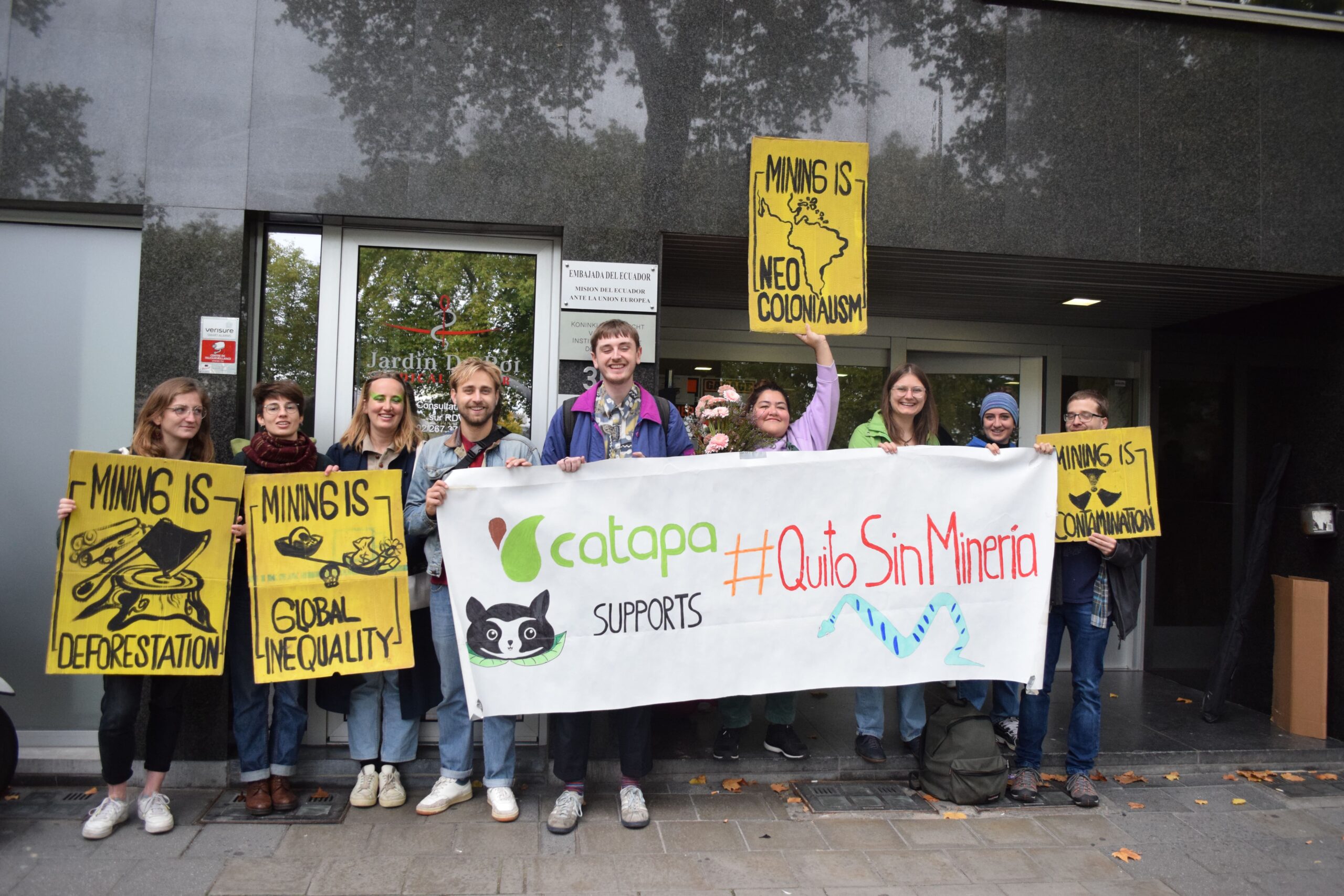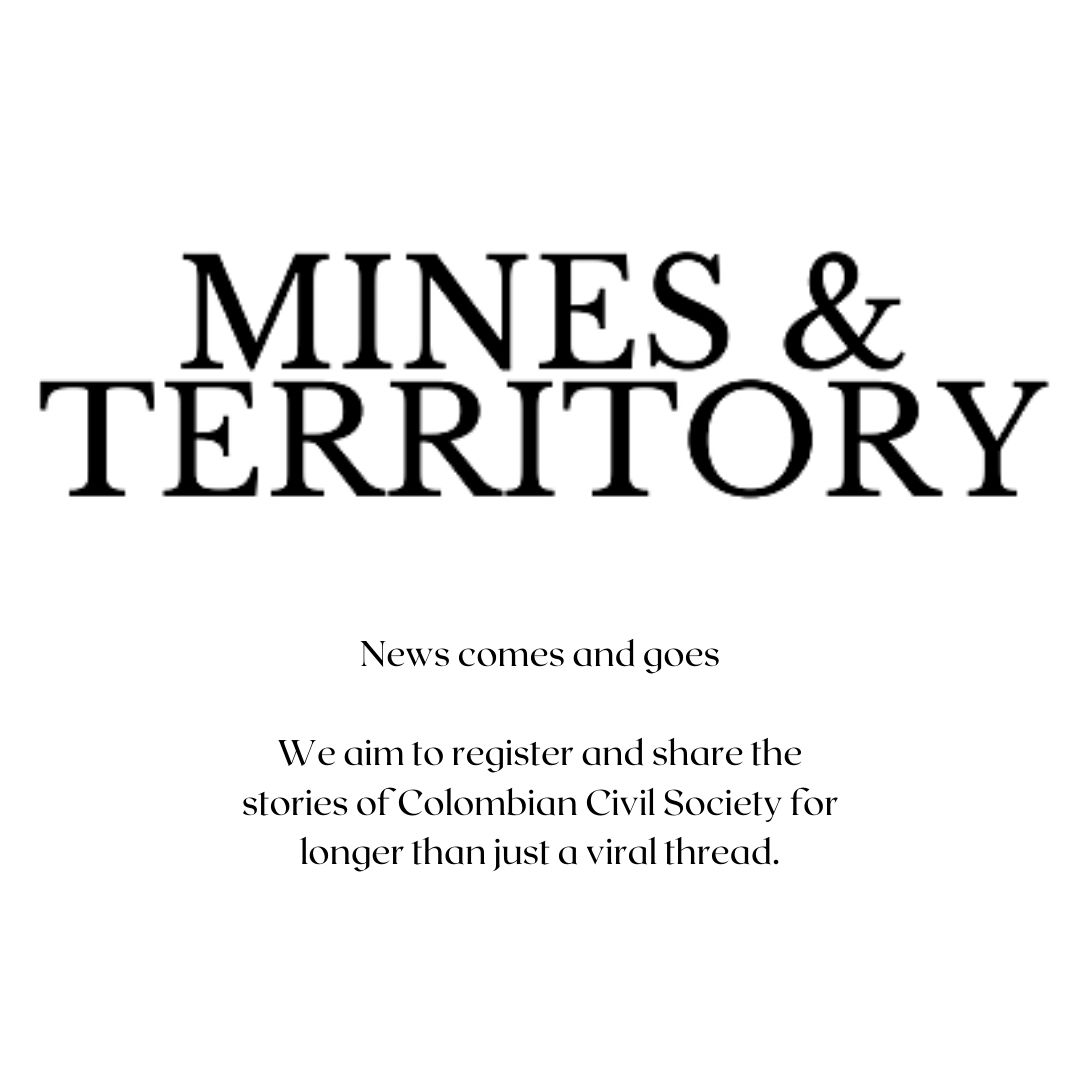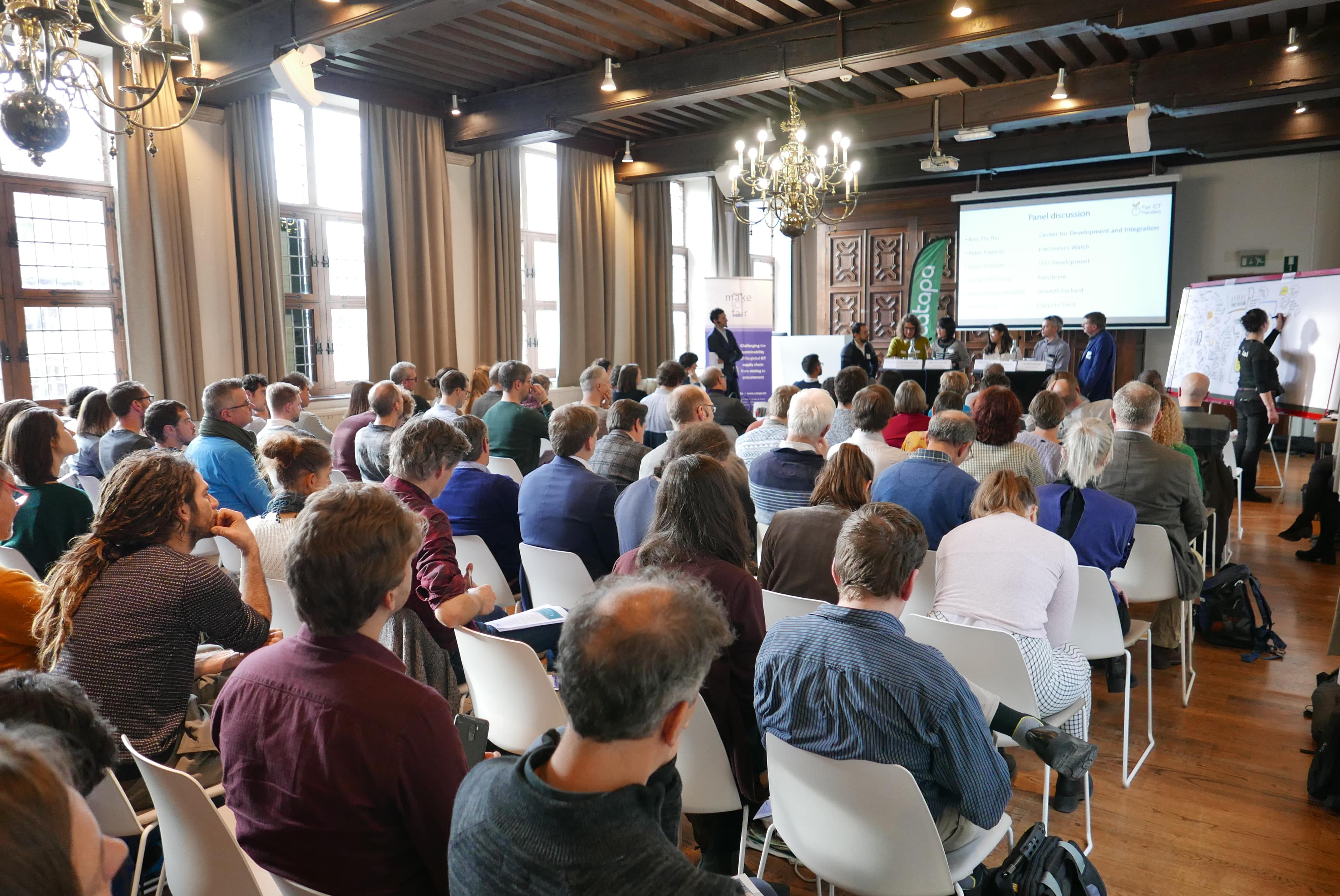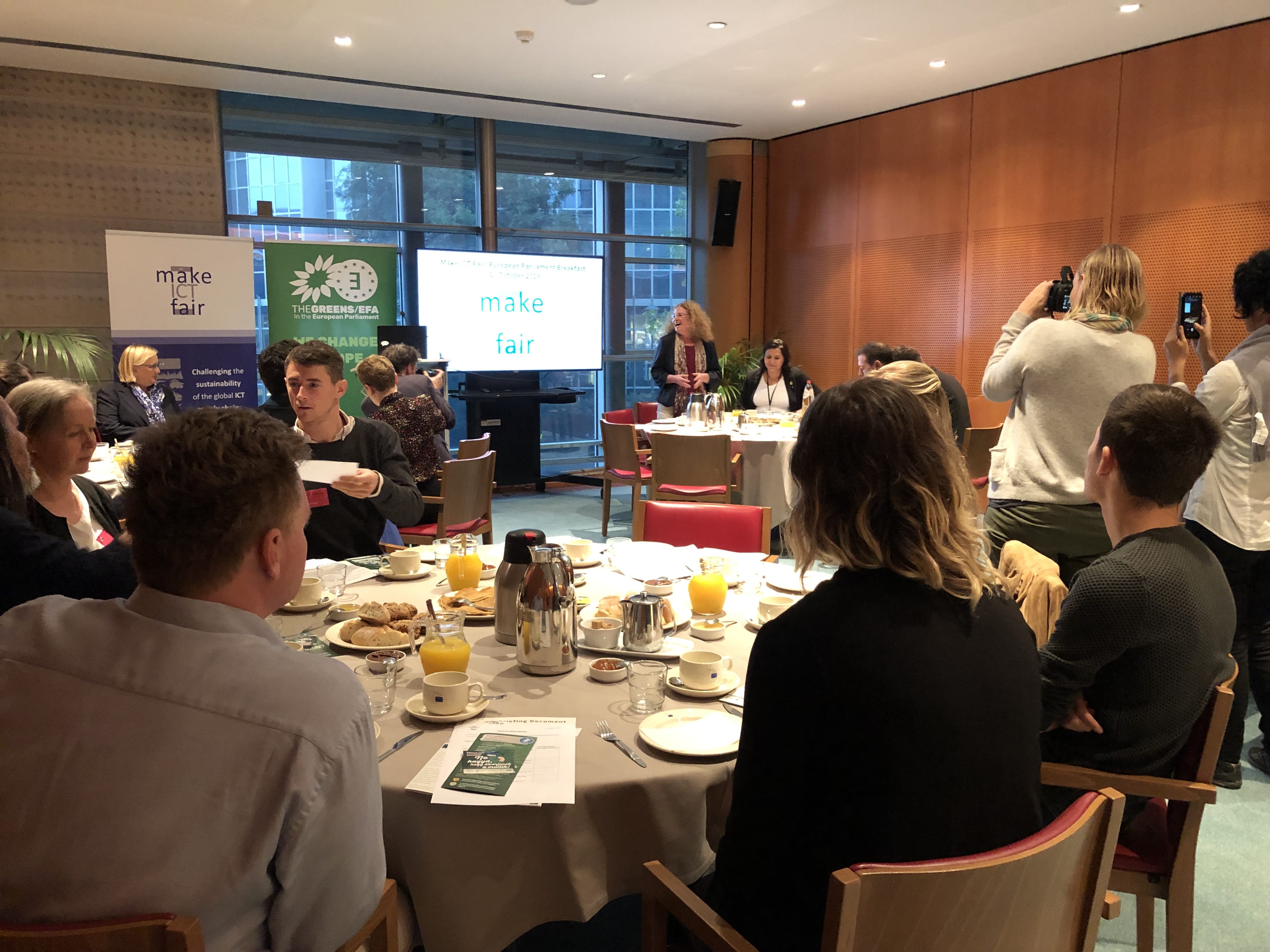


Mines & Territory – Visión General 2019 – Edición Especial
Colección, traducción y edición por Karlijn Van den Broeck, Jonas Adriaensens y Daniela Marques.
Puedes descargar esta Edición Especial de Mines & Territory 2019 aquí.

Flemish buyers go for Fair and Circular ICT
Flemish buyers go for Fair and Circular ICT
On 9 December, the ‘Conference on Fair & Circular ICT’ took place in Ghent, organised by Fair ICT Flanders. It was the first conference in Flanders to be entirely dedicated to the theme: “How can you, as an ICT buyer, do your bit towards a more sustainable world? With 110 participants, the conference shows that the theme is very much alive among buyers, sustainability employees and ICT professionals from public institutions and private companies.

The power of responsible purchasing
The production of laptops, smartphones, servers… is accompanied by many human rights violations and has an enormous ecological impact. With this conference, Fair ICT Flanders wants to provide concrete tools for large buyers of ICT hardware from the public and private sectors in Flanders. Through their purchasing policy, they can put pressure on the ICT companies and contribute to improving the local working and living conditions within the ICT supply chain. After speeches by Ghent Deputy Mayor Sofie Bracke and Chief Logistics Administrator of the University of Ghent Jeroen Vanden Berghe, Kim Claes, coordinator of Fair ICT Flanders opened the day: ‘There is a great potential. Purchasers in Flanders are still insufficiently aware of the power they have. Through their purchasing power, they can work for the protection of environmental and human rights. It is therefore good to look at what is happening in other European countries and to join forces here in Flanders.” Alain Linard, Head of Operations at Digipolis Gent indicated:
“We want to use people’s tax money in a responsible way. We do not want to contribute to human rights violations through our purchases and thus assume our responsibility.”

Need for change
The Vietnamese Ha Kim Thi Thu demonstrated the urgent need for change by highlighting the serious violations of labour rights in Vietnam within the factories of suppliers to, among others, Samsung, Panasonic and Intel. The other speakers discussed the possible solutions to the problems mentioned, ranging from worker-driven monitoring of the chain, certification labels for ICT to an own tracking system (from Fairphone). In the panel discussion, the speakers discussed with each other and it became clear that the challenges in the ICT chain require more than the standard social audits that are currently taking place. Peter Pawlicki, Director of Outreach and Education, of the NGO Electronics Watch, put it strongly:
“Employees are trained in what to say to auditors. These are the so-called ‘workers’ training courses’. An audit gives a false picture of the daily reality in the factory.”
In the afternoon, frontrunners from the EU and Flanders presented their good examples and the participants were able to enter into a dialogue with the invited experts. Ideas and possibilities to work on fair and/or circular ICT were discussed at discussion tables. The participants went home with a lot of inspiration and new ideas.
Fair ICT Flanders will offer 3 years of support to organisations that want to work on a more fair and circular ICT procurement policy.

The programme can still be found via this link. More info or questions.

Armenia: Amulsar, the Mountain where Water is more Precious than Gold
On the 2nd of October, CATAPA had the honor of receiving Armenian activist Anna Shahnazaryan, from the Armenian Environmental Front. She is part of the Save Amulsar campaign, which for years has been opposing the Amulsar gold mine by Lydian International. The Amulsar mine is the second largest gold deposit in Armenia. Shahnazaryan travelled to Belgium to have conversations with EU lobby groups and managed to give a short presentation with CATAPA.
During this gathering, we also met Laura Luciani (author of this article), who is a PhD student at the Centre for EU Studies of Ghent University, where she researches human rights and civil society in the South Caucasus.
ORIGINAL ARTICLE in the East Journal in Italian, by Laura Luciani.

Armenia: Amulsar, the Mountain where Water is more Precious than Gold
In 1986, a group of 350 Armenian intellectuals wrote an open letter to Mikhail Gorbačëv to denounce the catastrophic consequences of pollution caused by heavy industries, whose repercussions had long been ignored by the Soviet authorities. Even though for over thirty years environmental protests have been taking place in an almost cyclical way in Armenia, and the damages caused by irresponsible industrial practices are constantly monitored, today citizens still have to take to the streets to prevent yet another ecological disaster.
For seven years, local communities and environmentalist groups have been opposing the construction of a gold mine in Amulsar – a mountainous area in the South of Armenia, located in the centre of the national water supply system. But in the last year, in the wake of the political changes that affected Armenia, this local protest has taken on a transnational dimension: now, the “post-Velvet-Revolution” government led by Nikol Pashinyan finds itself having to handle it with caution.
The project and its impact
Armenia is a country rich in mineral resources including copper, gold, but also lead, silver, zinc and other industrial minerals; these constitute more than half of the country’s exports. With a surface of less than 30,000 km2, Armenia counts today around 27 authorized mineral sites, of which 17 are active. However, the exploitation of these deposits has for decades been at the centre of controversies due to mismanagement and to these extractive projects’ extremely negative environmental effects.
In 2012, a mining company called Lydian Armenia (subsidiary of the offshore company Lydian International) signs a first deal with the Armenian government, at that time led by the Republican Party. In 2016, the company receives the final mine operation permit, even though the project is highly problematic. Amulsar, which is the 2nd largest gold deposit in Armenia, is in fact located only 6 km away from the spa town of Jermuk, famous for its thermal water: the inhabitants (who were not consulted about the project and its impact) fear that the proximity of the mine and the pollution resulting from it may discourage tourist flows to the town, thus affecting the community’s main source of income.
Scientists also indicate that the project could have ecological repercussions on a much larger scale: the Amulsar deposit is located within a seismic area, which increases the risk that acid drainage processes, accelerated by the excavations, leak in and contaminate the surrounding rivers (Arpa, Vorotan and Darb), with negative consequences for agriculture and livestock. Furthermore, contamination threatens to reach Lake Sevan – the largest freshwater reservoir of the country and an almost sacred place in Armenian popular culture. Last but not least, the project would alter the Amulsar ecosystem, which hosts different protected species including the Caucasian leopard (or Persian leopard) – of which only 10 specimen remain in Armenia.
A turning point
After years of protest, in June 2018 the local communities decided to seize the window of opportunity opened by the “Velvet Revolution” that took place over one month earlier (thanks to an unprecedented wave of mass peaceful protests) to undertake direct action and block the streets leading to the mining site. The #SaveAmulsar campaign was born: for over a year and a half, local people supported by environmental activists have been supervising the entrance to the mine, doing shifts in checkpoints they built for this purpose, and managed to effectively stop the works in the construction site.
However, the citizens’ euphoria suffered a severe blow on 9 September this year: after opening an investigation and commissioning an independent assessment of the project’s environmental impact, prime minister Nikol Pashinyan unexpectedly gave the go-ahead for the digging in the Amulsar gold mine, asking protesters to clear the streets. As Anna Shahnazaryan, Armenian Environmental Front’s activist, explains in an interview for Kiosk (T.N. Italian radio programme), “the independent report, published in August, stated that Lydian’s estimations about the mine’s impact on water resources were incorrect, and that the project contained several evaluation errors – including intentional ones. Therefore, the environmental impact mitigation measures envisaged by Lydian were not adequate”.
Nevertheless, the Investigative Committee and the prime minister himself concluded that the company would be able to manage all the environmental risks. “For this reason, – Shahnazaryan continues – in the last two months the situation has become hectic: the prime minister took the side of Lydian and organized different meetings with the company’s representatives, while we activists took to the streets both in Amulsar and in Yerevan”.
“Post-revolutionary” Armenia and its problems
Experts suggest that Pashinyan is defending the private interests of Lydian Armenia and its investors (among which the USA, the United Kingdom and several international financial institutions) to prevent the company from having recourse to the Investor-State Dispute Settlement (ISDS). This is an international mechanism which allows a foreign investor to request arbitration by a corporate court if the “host-state” violates its rights: this decision could cost Armenia around two billion dollars, that is two thirds of its state budget.
However, there are also people who believe that Pashinyan’s ambiguous position is symptomatic of some criticalities of Armenia’s post-revolutionary government: first, the lack of an ideology going beyond the mere overthrow of the corrupt political system, which for ten years had been in the hands of former president Serzh Sarghsyan. According to Anna Shahnazaryan, “the current government uses many slogans, but behind the slogans there is little action. And one of these slogans is ‘we will not follow the economic path traced by the previous government, which focused on the mining industry, but we will try to develop new sectors such as tourism and the IT sector’”.
In reality, the “economic revolution” that Pashinyan wants to bring about in Armenia seems to be based on the same neo-liberal approach of the previous government, aimed at “opening up the country” to multinationals and foreign investors (with the 400 million dollars destined for Amulsar, Lydian would be the largest single investor in the history of independent Armenia). An understanding of “development” which disregards ecological considerations, human rights and the citizens’ well-being.
Another problem, Shahnazaryan points out, is that “with the revolution in Armenia people developed a certain idolatry of the current prime minister, who is considered the leader of the revolution. Many former activists who participated in the revolution and were then elected to Parliament have now expressed ‘unconditional support’ to Pashinyan’s position on Amulsar”. According to Shahnazaryan, this raised many doubts, even among those who were not necessarily opposed to the project, “because it is something that undermines the democratic structure of the country: the legislative body should not be ‘unconditionally supporting’ the person that it is in charge of supervising”.
#SaveAmulsar continues
Last year, the Armenian Environmental Front launched a petition requesting municipal councils in Jermuk and other towns in the region to ban all mining activities and declare Jermuk an ‘ecological area’. Although the petition has collected 12,000 signatures so far, the government has recently appealed against this initiative. Lydian Armenia is also putting pressure on protesters through legal channels.
Meanwhile, activists are trying to internationalize the movement, with the aim of exposing the responsibilities of international financial institutions (in this case, the European Bank for Reconstruction & Development) and other project funders (notably, the Swedish government which channelled money to Amulsar through state export-credit funds) in the global phenomenon of extractivism – namely non-sustainable development practices based on the extraction of mineral resources at the expense of local communities’ interests and the environment on which they depend.
Anna Shahnazaryan is convinced that the government cannot give a definitive authorization to Lydian “because the citizens are firmly opposed to the project, and if Pashinyan decides to use violent methods this will only turn against him”. The stakes in Amulsar seem to be very high: they do not “only” touch upon the protection of the environment and natural resources, but also the legitimacy of Nikol Pashinyan and the future of democracy in Armenia.

Press Release: Make ICT Fair Breakfast at the European Parliament
Press Release: Make ICT Fair Breakfast at the European Parliament
Raising Awareness of Human Rights Violations in ICT Supply Chains
On the morning of the 1st October, the Make ICT Fair consortium held a breakfast event at the European Parliament in Brussels attended by around thirty participants. The event was hosted by Austrian MEP Monika Vana of the Greens/EFA and Swedish MEP Abir Al-Sahlani of Renew Europe in the Members Salon of the Parliament. The breakfast was organised to raise awareness of sustainability and human rights abuses in the supply chain of information communication technology (ICT) products, as well as facilitate the discussion on the role of MEPs in promoting EU policies on human rights, European development banks and public procurement.

MEP Abir Al-Sahlani said: “Our societies have benefited greatly from globalization. But it is important to raise awareness of human rights risks associated with the production of some of the most popular products that many of us enjoy – like smartphones. People should never be in danger when doing their jobs.”
The breakfast began with a video testimonial addressed to MEPs from Pak Kin Wan, a worker in the Labour Education and Service Network in Hong Kong, and a speech by Anna Shahnazaryan who works in the Armenian Environmental Front in Armenia and had experienced first-hand the violations to human rights. Following this, speakers from SETEM, Bankwatch and Südwind gave talks on the priority EU areas of action: business and human rights, European development banks and public procurement.
“The situation of workers in ICT supply chains demands our immediate attention,” said MEP Monika Vana. “Human rights and labour rights are violated every day, alongside severely negative impacts on the environment in many countries. We as politicians have a responsibility and the possibility to act efficiently. It is us who can help to ensure that a legal framework is in place, that guides companies and financial institutions to carry out human rights due diligence before business or financial decisions are taken. We can also make sure that the European Parliament applies the same level of scrutiny towards its own ICT procurement.”

Make ICT Fair participant organisations presented the MEPs with a list of case studies conducted by members of the consortium, as well as a briefing document outlining the key actions MEPs can take to ensure the implementation of fair and sustainable EU policies on the priority areas.
Participants could upload photos and footage using the hashtag #MakeICTFair and #fairelectronics on social media.
For more information contact the Executive Director of the Fair Trade Advocacy Office, Sergi Corbalán, at corbalan@fairtrade-advocacy.org.
Notes
Make ICT Fair is an EU-wide project that aims to improve the lives of workers and communities affected by the production of ICT devices such as smartphones and laptops. We target EU citizens, public procurers, development banks, decision-makers, and companies to improve their purchasing practices and to align policies. The partners: SETEM Catalunya, CATAPA, ICLEI, the University of Edinburgh, Le Monde Diplomatique, People & Planet, CEE Bankwatch, Swedwatch, Electronics Watch, Towards Sustainability Association, and Südwind.




